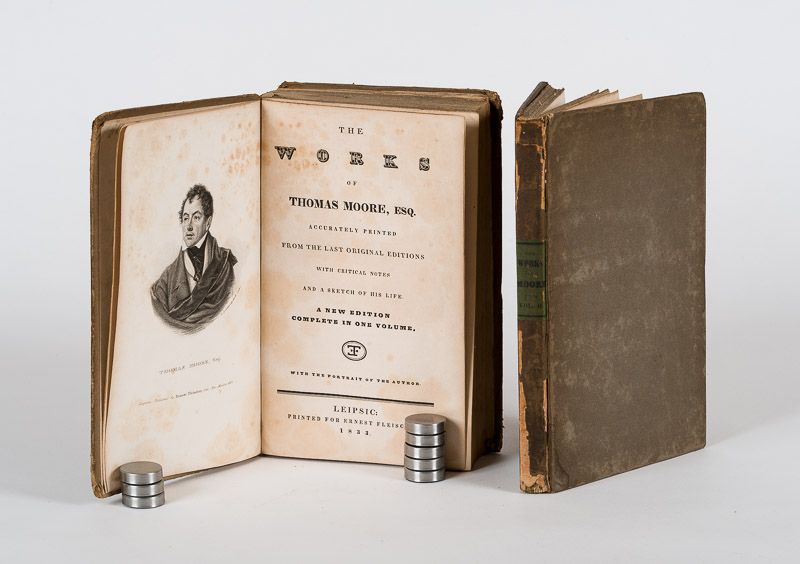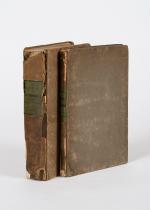Moore, The works of Thomas Moore, Esq.
The works of Thomas Moore, Esq. Accurately printed from the last original editions. With critical Notes. [With a preface by Ernest Fleischer and a “Biographical and Critical Sketch of Thomas Moore” by J.W.Lake].
In Two Complete Volumes. Leipsic, printed for Ernst Fleischer, 1833-1840. Large Octavo. Vol. I: XL, 751 pages / Vol. II:VI, 252 pages. Including a frontispiece – portrait of Thomas Moore. Original Hardcover. Poor condition of the binding with signs of external wear. Both volumes’ spines are considerably worn and fragile; there is discolouration to the frontcovers of both volumes, and foxing on inside and selective pages of both. From the reference library of Hans Christian Andersen – Translator Erik Haugaard. With his Exlibris to the pastedown. Internally firm and complete and only with some minor signs of a faded dampstain.
Includes for example: The Loves of the Angels / Lalla Rookh / The Fudge Family in Paris / Irish Melodies / M.P. or the Blue Stocking / Odes of Anacreon / Tom Crib’s Memorial to Congress / A Letter to the Roman Catholics of Dublin / etc. etc.
Thomas Moore (28 May 1779 – 25 February 1852) was an Irish poet, singer, songwriter, and entertainer, now best remembered for the lyrics of “The Minstrel Boy” and “The Last Rose of Summer”. He was responsible, with John Murray, for burning Lord Byron’s memoirs after his death. In his lifetime he was often referred to as Anacreon Moore.
From a relatively early age Moore showed an interest in music and other performing arts. He sometimes appeared in musical plays with his friends, such as The Poor Soldier by John O’Keeffe (music by William Shield), and at one point had ambitions to become an actor. Moore attended several Dublin schools including Samuel Whyte’s English Grammar School in Grafton Street where he learned the English accent with which he spoke for the rest of his life. In 1795 he graduated from Trinity College, which had recently allowed entry to Catholic students, in an effort to fulfill his mother’s dream of him becoming a lawyer. Moore was initially a good student, but he later put less effort into his studies. His time at Trinity came amidst the ongoing turmoil following the French Revolution, and a number of his fellow students such as Robert Emmet were supporters of the United Irishmen movement, although Moore himself never was a member. This movement sought support from the French government to launch a revolution in Ireland. In 1798 a rebellion broke out followed by a French invasion, neither of which succeeded.
Besides Emmet, another formative influence was Edward Hudson, also a fellow student at Trinity College, who played a crucial role in introducing Moore to Edward Bunting’s A General Collection of the Ancient Irish Music (1797), later one of the main sources of his own collection of Irish Melodies. (Wikipedia)
- Keywords: Catalogue Irish History Seven – Irish Literature – Poetry – Music – Theatre · Catalogue Irish History Three – From Famine to Free State · Catalogue Irish History Two – Origins of Irish Identity · Irish History in the 19th century · Irish History of Music · Irish Literature – Rare · Irish Song · Irish Songs · Music – Rare
- Language: English
- Inventory Number: 44814AB
EUR 150,--
© 2024 Inanna Rare Books Ltd. | Powered by HESCOM-Software












